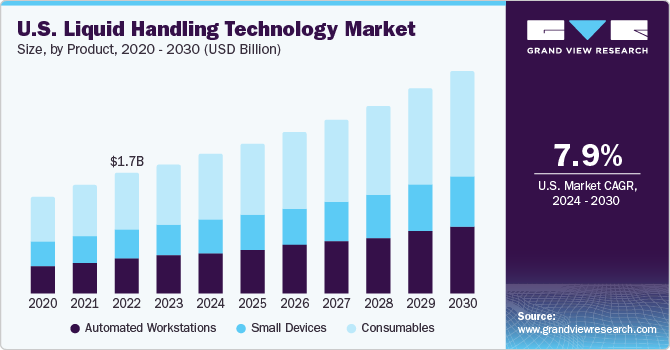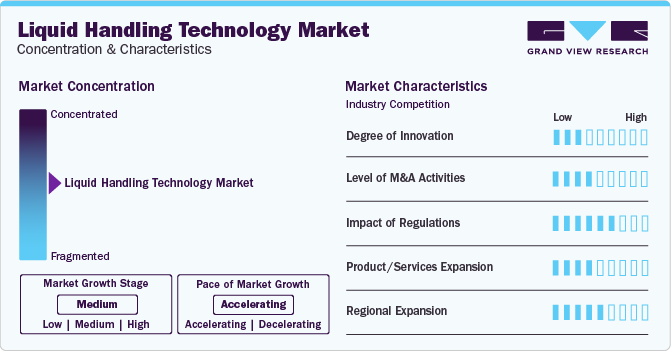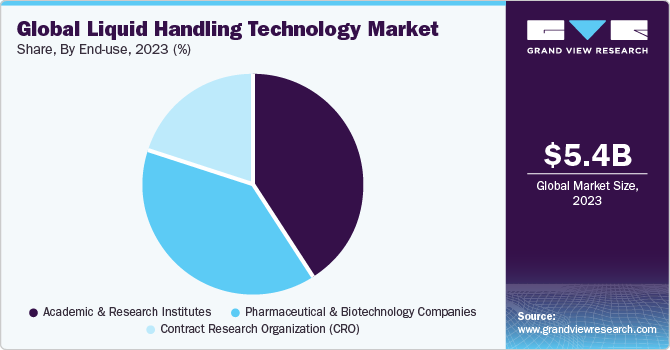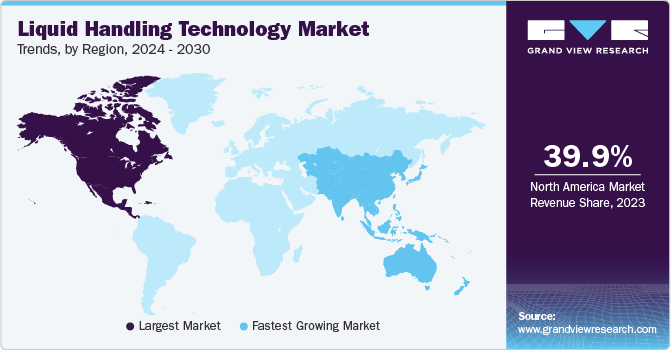- Home
- »
- Biotechnology
- »
-
Liquid Handling Technology Market Size Report, 2030GVR Report cover
![Liquid Handling Technology Market Size, Share & Trends Report]()
Liquid Handling Technology Market (2024 - 2030) Size, Share & Trends Analysis Report By Product (Small Devices, Consumables), By Type (Manual, Automated), By End-use, By Application, By Region, And Segment Forecasts
- Report ID: GVR-2-68038-114-6
- Number of Report Pages: 130
- Format: PDF
- Historical Range: 2018 - 2022
- Forecast Period: 2024 - 2030
- Industry: Healthcare
- Report Summary
- Table of Contents
- Segmentation
- Methodology
- Download FREE Sample
-
Download Sample Report
Liquid Handling Technology Market Summary
The global liquid handling technology market size was estimated at USD 5.36 billion in 2023 and is projected to reach USD 9.63 billion by 2030, growing at a CAGR of 8.76% from 2024 to 2030. In recent years, the market has shown significant expansion potential due to the global growth of pharmaceutical and biotechnology industries, particularly in the R&D sector and life science research.
Key Market Trends & Insights
- In terms of region, North America was the largest revenue generating market in 2023.
- Country-wise, Germany is expected to register the highest CAGR from 2024 to 2030.
- By product, the consumables segment held the largest revenue share of over 47.1% in 2023.
- By type, the semi-automated liquid handling segment accounted for the largest revenue share in 2023.
- By application, the drug discovery & ADME tox research segment dominated the market in 2023.
Market Size & Forecast
- 2023 Market Size: USD 5.36 Billion
- 2030 Projected Market Size: USD 9.63 Billion
- CAGR (2024-2030): 8.76%
- North America: Largest market in 2023
Furthermore, there has been a swift rise in the execution of assays for diverse research objectives, including target screening, contributing to an increased demand for liquid handling technologies.

The COVID-19 outbreak led to a surge in demand for diagnostic testing, vaccine development, and research related to the viruses. This increased demand for liquid handling solutions such as automated liquid handlers, pipettes, and dispensers. These technologies are crucial for efficient and accurate sample processing, which was essential during the pandemic. The urgent need for diagnostics, treatments, and vaccines for COVID-19 prompted a rapid increase in research and development activities. Further, these technologies played a vital role in automating and streamlining laboratory workflows, enabling scientists to process a large number of samples and conduct experiments more efficiently.
The advancement of sophisticated liquid handlers plays a pivotal role in improving clinical research by lowering development costs and expediting the swift introduction of drugs. Consequently, pharmaceutical firms are increasingly inclined towards embracing advanced systems to streamline the drug approval process. Manufacturers have innovated workstations employing various technologies to dispense droplets from the dispensing tool, overcoming surface adhesion challenges. These technologies encompass ultrasound, piezoelectric, and solenoid. For instance, LABCYTE INC. incorporates Echo acoustic liquid handling technology in its products, providing a non-contact dispensing solution.
The efficient miniaturization of assay platforms contributes to a reduction in workflow costs, leading to a decrease in the consumption of costly reagents. Tailored for highly accurate handling in processes such as plate washing, bulk dispensing, and liquid transfer, these miniaturized platforms offer cost-effective solutions. Notable providers of compact benchtop workstations include Hamilton Company, PerkinElmer, Beckman Coulter, and LABCYTE INC.
Market Concentration & Characteristics
The market exhibits a significant degree of innovation, marked by the continuous development of advanced automation, precision, and integration features in liquid handling systems, meeting the evolving needs of laboratories and industries for efficient and accurate liquid manipulation.

Several market players, such as Thermo Fisher Scientific, Inc; Agilent Technologies, Inc.; and Danaher Corporation, are involved in merger and acquisition activities. Through M&A activity, these companies can expand their geographic reach and enter new territories.
The market is influenced by rigorous regulatory standards that shape compliance with quality assurance, data integrity, and calibration requirements, impacting both product development and industry practices.
Potential substitutes in the market include alternative lab automation systems, such as robotic platforms, and manual handling solutions, providing options for laboratories with diverse throughput needs and budget constraints.
Liquid handling technology companies pursue regional expansion by establishing local facilities and partnerships, responding to demand variations, complying with regional standards, and fostering closer collaborations with research and industrial sectors in target regions.
Product Insights
The consumables segment held the largest revenue share of over 47.1% in 2023. The substantial need for sample inputs and frequent utilization of these products contribute to increased expenses due to the repetitive procurement of consumables by laboratory professionals. This pattern, in turn, acts as a catalyst for revenue growth in this segment. Furthermore, factors such as advancements in research and development, the growth of biotechnology and pharmaceutical industries, and the rising adoption of personalized medicine collectively contribute to the elevated consumption of consumables.
The automated workstations segment is expected to show lucrative growth during the forecast period. To meet the rising demand for automated solutions within research communities, companies are actively engaging in innovation by creating advanced automated workstations. These workstations incorporate state-of-the-art technologies, including acoustic energy and Digital Microfluidics (DMF), with the anticipation that such advancements will play a substantial role in propelling market growth.
Type Insights
The semi-automated liquid handling segment accounted for the largest revenue share in 2023. The preference for semi-automated liquid handling systems stems from their cost-effectiveness in comparison to fully automated counterparts. Striking a balance between automation and manual control, these systems present a more economical choice for laboratories facing budget constraints or having specific requirements that do not mandate complete automation. In addition, semi-automated liquid handling systems enhance handling processes by markedly reducing the time and effort involved in repetitive tasks. This heightened efficiency and improved throughput empower laboratories to manage larger sample volumes, enhance productivity, and accelerate research timelines.
The automated liquid handling segment is estimated to register the fastest CAGR over the forecast period. The surge in growth is linked to the emergence of innovative automated liquid handling workstations designed for non-contact dispensing, expected to be a key driver for the market. While contact dispensing has been widely adopted over the years due to its reliability, simplicity, and cost-effectiveness, the evolving liquid handling requirements, coupled with a reduction in sample size, have prompted a shift in the industry.
Application Insights
The drug discovery & ADME tox research segment dominated the market in 2023. Liquid handling workstations play a vital role in driving the progress of new drug development. Their applications in drug discovery and ADME-Tox research encompass a range of functions, such as performing stepwise serial dilutions across a broad concentration spectrum, facilitating the selection and transfer of compounds for retesting, and enabling confirmatory and in-depth analysis. Within the domains of drug discovery and ADME-Tox research, these workstations are widely utilized for activities such as plate replications, plate-to-plate dilutions, and plate reformatting.
The cancer & genomic research segment has been anticipated to show lucrative growth over the forecast period. The significance of liquid handling in cancer and genomic research is paramount, primarily driven by the need to dispense protein or DNA solutions onto substrates or microwells. Furthermore, the subsequent phases of synthesis and analysis frequently demand the precise dispensing of additional solutions. Manual liquid handling techniques for these processes become impractical and laborious.
End-use Insights
The academic & research institutes segment dominated the market in 2023. In the realm of life science experiments, institutes hold a pivotal position, especially in endeavors related to gene sequencing, antibody testing, drug screening, and protein crystallization, all of which frequently involve the manipulation of very small sample volumes. Consequently, there is an increasing need for automated approaches, including sensor-integrated robotic systems, to streamline these tasks, contributing to the revenue growth of the academic and research institutes segment.

The contract research organization (CRO) segment has been anticipated to show lucrative growth over the forecast period. The surge in growth is a result of the prevailing tendency to outsource drug manufacturing processes. In addition, Contract Research Organizations (CROs) are experiencing heightened pressure to enhance productivity and meet stringent timelines, which is expected to positively influence the forthcoming adoption of liquid handling solutions by CROs.
Regional Insights
North America dominated the market with a revenue share of 39.88% in 2023. The prevalent dominance in this sector can be credited to the robust distribution networks established by key market players and the rapid integration of advanced automation solutions within the region. Moreover, competitors in North America have strategically formed partnerships with distinguished academic universities and research centers in Europe, aiming to strengthen their revenue streams. This collaborative approach is a direct response to the notable concentration of academic and research institutes in Europe.

The U.S. accounted for the largest revenue share of the market in the North America region in 2023. The U.S. has a robust and well-established life sciences and biotechnology sector, with numerous research institutions, pharmaceutical companies, and academic centers actively engaged in advancing scientific discoveries.In addition, a favorable regulatory environment and a high level of technological innovation contribute to the U.S. maintaining a leadership position in the adoption and development of liquid handling technologies within the North American market.
The Asia Pacific region is expected to grow at the fastest rate during the forecast period. The swiftest growth in the market can be attributed to the rapid progress achieved by biopharma and biotechnology companies, along with Contract Research Organizations (CROs) and Contract Development and Manufacturing Organizations (CDMOs) in nations such as Japan and China. In addition, the substantial investments made by Japan and China in various life science sectors, encompassing omics research, advanced healthcare, microbiology, drug development, and clinical diagnostics, are anticipated to serve as key drivers for market expansion.
China accounted for the largest revenue share of the market in the Asia Pacific region in 2023. The country has experienced rapid economic growth and increased investments in research and development, fostering a burgeoning biotechnology and life sciences sector. Furthermore, China's commitment to innovation is evident in its emphasis on scientific advancements, with a focus on precision medicine, genomics, and other cutting-edge fields that heavily rely on liquid handling technologies.
Key Liquid Handling Technology Company Insights
Some of the key players operating in the market include Thermo Fisher Scientific, Inc., Danaher Corporation, and Agilent Technologies, Inc
-
Thermo Fisher Scientific, Inc offers a range of liquid handling technologies, including automated liquid handlers, electronic pipettes, and a variety of pipette tips.
-
Danaher Corporation, through its Life Sciences platform, offers a range of liquid handling technologies and automated systems for various applications, including next-generation sequencing (NGS), genomic, cellular, as well as protein.
-
Gilson, Inc. andEppendorf AG are some of the emerging market players in the Liquid Handling Technology market.
-
Gilson, Inc. offers a variety of liquid handling technologies, including automated liquid handlers and electronic pipettes. Some of the specific products and technologies they provide are Gilson's PIPETMAN technology.
Key Liquid Handling Technology Companies:
The following are the leading companies in the liquid handling technology market. These companies collectively hold the largest market share and dictate industry trends. Financials, strategy maps & products of these liquid handling technologycompanies are analyzed to map the supply network.
- Thermo Fisher Scientific, Inc.
- Agilent Technologies, Inc
- Danaher Corporation
- Gilson, Inc
- PerkinElmer
- Tecan Group Ltd.
- Hamilton Company
- Eppendorf SE.
Recent Developments
-
In March 2023, Eppendorf SE unveiled the new generation of epMotion, an automated liquid handling portfolio, which offers enhanced precision, accuracy, and user experience.
-
In May 2023, Opentrons unveiled the Opentrons Flex robot, a cost-effective and user-friendly liquid-handling lab robot. This new-generation robot is specifically designed to democratize access to advanced lab automation, making it accessible to labs of all sizes and extending its benefits to a broader community of researchers.
-
In December 2023, Hudson Robotics and Art Robbins Instruments, a worldwide provider of laboratory automation solutions and a portfolio company of Argosy Healthcare Partners, have successfully acquired Tomtec Inc. Tomtec specializes in automated liquid handling instruments primarily utilized for sample preparation in mass spectrometry.
-
In February 2022 , SPT Labtech introduced the innovative Firefly liquid handling platform for next-generation sequencing library preparation, along with the Apricot DC1, a versatile 4-in-1 automated liquid handling platform, during the Society for Laboratory Automation and Screening (SLAS) 2022 International Conference and Expo.
-
In June 2022 , Beckman Coulter Life Sciences expedites the advancement of Next Generation Sequencing with the introduction of the Biomek NGeniuS liquid handling system.
Liquid Handling Technology Market Report Scope
Report Attribute
Details
Market size value in 2024
USD 5.82 billion
Revenue forecast in 2030
USD 9.63 billion
Growth rate
CAGR of 8.76% from 2024 to 2030
Base year for estimation
2023
Historical data
2018 - 2022
Forecast period
2024 - 2030
Quantitative units
Revenue in USD million/billion and CAGR from 2024 to 2030
Report coverage
Revenue forecast, company ranking, competitive landscape, growth factors, and trends
Segments covered
Product, type, application, end-use, region
Regional scope
North America; Europe; Asia Pacific; Latin America; MEA
Country scope
U.S.; Canada; UK; Germany; France; Italy; Spain; Denmark; Sweden; Norway; Japan; China; India; Australia; Thailand; South Korea; Brazil; Mexico; Argentina; South Africa; Saudi Arabia; UAE; Kuwait
Key companies profiled
Thermo Fisher Scientific; Danaher Corporation; Agilent Technologies; Gilson, Inc.; PerkinElmer; Tecan Group Ltd.; Hamilton Company, Eppendorf SE
Customization scope
Free report customization (equivalent up to 8 analysts working days) with purchase. Addition or alteration to country, regional & segment scope.
Pricing and purchase options
Avail customized purchase options to meet your exact research needs. Explore purchase options
Global Liquid Handling Technology Market Report Segmentation
This report forecasts revenue growth at global, regional & country levels and provides an analysis of the industry trends in each of the sub-segments from 2018 to 2030. For this study, Grand View Research has segmented the global liquid handling technology market report based on product, type, application, end-use, and region:
-
Products Outlook (Revenue, USD Million, 2018 - 2030)
-
Automated Workstations
-
Standalone Workstations
-
Integrated Workstations
-
-
Small Devices
-
Pipettes
-
Electronic Pipettes
-
Manual Pipettes
-
Pipette Controllers
-
-
Burettes
-
Dispensers
-
Others
-
-
Consumables
-
Regents
-
Disposable Tips
-
Tubes & Plates
-
Others
-
-
-
Type Outlook (Revenue, USD Million, 2018 - 2030)
-
Automated Liquid Handling
-
Manual Liquid Handling
-
Semi-automated Liquid Handling
-
-
Application Outlook (Revenue, USD Million, 2018 - 2030)
-
Drug Discovery & & ADME-Tox Research
-
Cancer & Genomic Research
-
Bioprocessing/Biotechnology
-
Others
-
-
End-use Outlook (Revenue, USD Million, 2018 - 2030)
-
Pharmaceutical & Biotechnology Companies
-
Contract Research Organization (CRO)
-
Academic & Research Institutes
-
-
Regional Outlook (Revenue, USD Million, 2018 - 2030)
-
North America
-
U.S.
-
Canada
-
-
Europe
-
U.K.
-
Germany
-
France
-
Italy
-
Spain
-
Denmark
-
Sweden
-
Norway
-
-
Asia Pacific
-
Japan
-
China
-
India
-
South Korea
-
Australia
-
Thailand
-
-
Latin America
-
Brazil
-
Mexico
-
Argentina
-
-
Middle East & Africa
-
South Africa
-
Saudi Arabia
-
UAE
-
Kuwait
-
-
Frequently Asked Questions About This Report
b. Based on product, the consumables segment accounted for the largest share of 47.06% in 2023. The substantial need for sample inputs and frequent utilization of these products contribute to increased expenses due to the repetitive procurement of consumables by laboratory professionals.
b. Some of the key players of the market include Thermo Fisher Scientific, Danaher, Agilent Technologies, Gilson, Inc., PerkinElmer, Tecan Group Ltd., Hamilton Company, and Eppendorf SE.
b. An increase in investment in drug development, clinical trials, and life sciences R&D and rapid adoption of automation are some of the key factors driving the market growth.
b. The global liquid handling technology market size was estimated at USD 5.36 billion in 2023 and is expected to reach USD 5.82 billion in 2024.
b. The global liquid handling technology market is expected to grow at a compound annual growth rate of 8.76% from 2024 to 2030 to reach USD 9.63 billion by 2030.
Share this report with your colleague or friend.
Need a Tailored Report?
Customize this report to your needs — add regions, segments, or data points, with 20% free customization.

ISO 9001:2015 & 27001:2022 Certified
We are GDPR and CCPA compliant! Your transaction & personal information is safe and secure. For more details, please read our privacy policy.
Trusted market insights - try a free sample
See how our reports are structured and why industry leaders rely on Grand View Research. Get a free sample or ask us to tailor this report to your needs.










